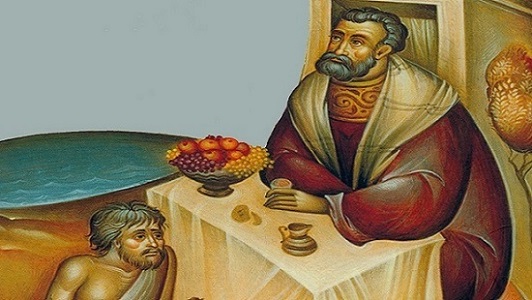A Prayer From Hell

“And he cried and said, Father Abraham, have mercy on me, and send Lazarus, that he may dip the tip of his finger in water, and cool my tongue; for I am tormented in this flame.” —Luke 16:24
Our Saviour gives us the history of two men as no other person could. First He gives a brief account of their lives on earth: one man is rich and enjoys the luxuries of the world, while the other is very poor and must beg for a miserable sustenance. Then our Lord tells of these two men at death: the rich man is buried, no doubt very elaborately, with many mourners in attendance; the beggar also died and was afforded no better funeral than the potter’s field could provide. To this point, perhaps, any biographer could take us. However, the Saviour goes on to show us these two men in eternity! He was not compelled to stop where human writers must, because He could pull back that thin veil which separates this life from the next and unfold their eternal state.
While they lived, this is a story of two satisfied men: the beggar is satisfied with nothing but God; the rich man is satisfied with everything but God! Nonetheless, how soon after death had the rich man’s satisfaction completely disappeared! In agony he cries out in prayer from the eternal burning. The Bible records many prayers, but in this passage we have the only account of a prayer from hell!
The Circumstances of This Prayer Serve for Our Instruction.
Consider that the rich man prayed when he saw the Kingdom of God: “He lift up his eyes…and seeth” (vs.23). Like so many others, he had never been aware of spiritual realities in this life. It was not that he denied them, he was merely oblivious of them! The reason for this was that he had never experienced the New Birth. Jesus said, “Except a man be born again, he cannot see the kingdom of God (Joh 3:3). In this world, a sure evidence of God’s quickening power within is the realization of spiritual verities[1] that drives one to begin to cry out to God in prayer.
He prayed earnestly from a sense of need: “being in torments” (vs. 23). During his lifetime he had often “said his prayers.” Being a religious man, he was not unfamiliar with a cold, formal type of praying, both public and private. How blasphemous a thing it is for us just to say prayers, whether they are written or spontaneous! But now the man is praying with all his might, without the aid of a prayer book. Had he prayed so earnestly while he lived on earth, he would not have come to that place of torment!
He prayed in great soul-agony: “And in hell…he cried” (vv. 23-24). Since he had never experienced such agony of soul on earth, therefore he had never so prayed. Some have known what it has been to be pressed to such painful prayer in this life. Some can say with the psalmist, “The sorrows of death compassed me, and the pains of hell gat hold upon me: I found trouble and sorrow” (see Psa 116:1-8). Would to God that all knew such trouble and sorrow of heart here and now—most are far too satisfied and comfortable to pray so! Rees Howells well said, “These three aspects are never found in ordinary prayer: identification, agony, and authority.” The most pitiable sight on earth is an unsaved soul at peace!
Sadly we note that he prayed too late! How we long to see people stirred by a realization of God’s Kingdom beginning to pray in earnestness and agony of soul. This must be done, however, while yet there is time. We must “seek the Lord while he may be found,” while we yet have our life and being upon this earth—or else we pray too late.
The Petitions of This Prayer Are Intended for Our Correction.
This man prayed to the wrong person: “Father Abraham” (vs. 24). Even “the friend of God” and “the father of all the faithful” is no correct object of prayer (Jam 2:23; Gal 3:8-9). It is more than a little interesting that this is the only prayer in the Bible addressed to a saint! Remember: it came from hell! Only God can answer prayer and He alone, in the Trinity of His Being, is to be addressed in prayer. Let those who make it a practice to pray to “the Mother of God,” or any other saint, be corrected by this hellish petition!
He asked for the wrong deliverer: “and send Lazarus” (vs. 24). Lazarus indeed was now among the blessed who had come to an end of all hunger, thirst, pain, and tears (Rev 7:15-17), but he was not able to relieve this rich man’s agony—nor are any of the saints above! He could not surmount nor cross that “great gulf ” between him and the damned (vs. 26). God sent, in the fulness of time, the only deliverer, Jesus Christ, His own Son! He spanned the “great gulf ” between God and man in His nature when He took upon Himself our flesh. He lived a perfect life and satisfied actively all that the Law of God demanded of our race. Going to Calvary, Jesus did bear our sins in His own body and bridged that infinite expanse between our sin and God’s righteousness. Having ignored and rejected Him, there was no other hope for this man, nor for any other! In vain does any sinner seek consolation from any other but Christ (Act 4:12)!
He sought the wrong water: “Send Lazarus, that he may dip the tip of his finger in water, and cool my tongue” (vs. 24). Even if Lazarus could have crossed over and done as this rich man requested, what good would such water have done him? How long would such a momentary cooling have benefited him in those flames? Oh, that he had asked for and received, while he yet lived on earth, the Living Water, which Jesus alone can give (Joh7:37-39)! Then had his soul been eternally refreshed and satiated!
The Answer to This Prayer Is for Our Solemn Warning.
We should tremble to see that the answer given to this prayer from hell is only mockery! This should not surprise us since mockery is exactly what God has promised to such a prayer as this. “Because I have called, and ye refused; I have stretched out my hand, and no man regarded; But ye have set at nought all my counsel, and would none of my reproof: I also will laugh at your calamity; I will mock when your fear cometh” (Pro 1:24-26). Notice how each part of Abraham’s reply is only sheer mockery:
He called him “Son” (vs. 25). He was a son of the flesh, but not of the Spirit. He was a son of Abraham by the first birth, but not a son of God by regeneration.[2] To bring up this natural relationship now that he was in the flames of hell was only mockery. Many who are baptized church members, but not saved, will likewise be mocked one day!
He asked him to “remember” (vs. 24). What memories there will be in hell! This is one thing that this man did not wish to do, nor will anyone who makes their bed in hell. He has that for which he had sold his soul, called “thy good things.” Though once considered dear, all his purple clothing and sumptuous fare now only bitterly mock this man!
He is directed to consider what he has missed: “But now he is comforted, and thou art tormented” (vs.25). Never once on earth had he faintly thought of changing places with Lazarus, but now he would give ten thousand worlds of gold to do so!
He is told hell is forever: “There is a great gulf fixed” (vs. 26). To go to hell is to be there forever. There will never be the hope of a brighter day or of relief from the torments of that pit. This dread fact will mock its inhabitants as long as God lives!
by Holmes Moore
“Forasmuch then as the children are partakers of flesh and blood, he also himself likewise took part of the same; that through death he might destroy him that had the power of death, that is, the devil; And deliver them who through fear of death were all their lifetime subject to bondage.” (Heb 2:14-15)
“Let this mind be in you, which was also in Christ Jesus: Who, being in the form of God, thought it not robbery to be equal with God: But made himself of no reputation, and took upon him the form of a servant, and was made in the likeness of men: And being found in fashion as a man, he humbled himself, and became obedient unto death, even the death of the cross. Wherefore God also hath highly exalted him, and given him a name which is above every name: That at the name of Jesus every knee should bow, of things in heaven, and things in earth, and things under the earth; And that every tongue should confess that Jesus Christ is Lord, to the glory of God the Father.” (Phi 2:5-11)
“Think not that I am come to destroy the law, or the prophets: I am not come to destroy, but to fulfill. For verily I say unto you, Till heaven and earth pass, one jot or one tittle shall in no wise pass from the law, till all be fulfilled.”(Mat 5:17-18)
“For I delivered unto you first of all that which I also received, how that Christ died for our sins according to the scriptures.”(1Co 15:3)
“For Christ also hath once suffered for sins, the just for the unjust, that he might bring us to God, being put to death in the flesh, but quickened by the Spirit. (1Pe 3:18)
“For he hath made him to be sin for us, who knew no sin; that we might be made the righteousness of God in him.” (2Co 5:21)
“Neither is there salvation in any other: for there is none other name under heaven given among men, whereby we must be saved.”(Act 4:12)
© Copyright 1999 Chapel Library. Permission is expressly granted to reproduce this material by any means, provided1) you do not charge beyond a nominal sum for cost of duplication and 2) this copyright notice and all the text on this page are included.
Chapel Library is a faith ministry that relies entirely upon God’s faithfulness. We therefore do not solicit donations, but we gratefully receive support from those who freely desire to give. Chapel Library does not necessarily agree with all the doctrinal positions of the authors it publishes.
Worldwide, please download material without charge from our website, or contact the international distributor as listed there for your country. In North America, for additional copies of this booklet or other Christ-centered materials from prior centuries, please contact
CHAPEL LIBRARY
2603 W.WRIGHT ST.•PENSACOLA,FLORIDA 32505•USA
chapel@mountzion.org • www.ChapelLibrary.org
850 438-6666 • M-F 9-5 CT • fax 850 438-0227
A worldwide ministry of Mt. Zion Bible Church
Photo Credit pemptousia.com
[1] verities– truths
[2] regeneration– new spiritual life given by the power of the Holy Spirit; being born again.


